Dacia Spring vs Skoda Fabia – Which model is better for everyday use?
Two cars, one duel: Dacia Spring meets Skoda Fabia.
Which one wins in performance, efficiency and value for money? Find out now!
Costs and Efficiency:
Looking at overall running costs, both models reveal some interesting differences in everyday economy.
Dacia Spring has a a bit advantage in terms of price – it starts at 14500 £, while the Skoda Fabia costs 16900 £. That’s a price difference of around 2392 £.
Engine and Performance:
Under the bonnet, it becomes clear which model is tuned for sportiness and which one takes the lead when you hit the accelerator.
When it comes to engine power, the Skoda Fabia has a clearly edge – offering 177 HP compared to 65 HP. That’s roughly 112 HP more horsepower.
In acceleration from 0 to 100 km/h, the Skoda Fabia is significantly quicker – completing the sprint in 7.40 s, while the Dacia Spring takes 13.70 s. That’s about 6.30 s faster.
In terms of top speed, the Skoda Fabia performs decisively better – reaching 228 km/h, while the Dacia Spring tops out at 125 km/h. The difference is around 103 km/h.
There’s also a difference in torque: Skoda Fabia pulls clearly stronger with 250 Nm compared to 125 Nm. That’s about 125 Nm difference.
Space and Everyday Use:
Cabin size, boot volume and payload all play a role in everyday practicality. Here, comfort and flexibility make the difference.
Seats: Skoda Fabia offers to a small extent more seating capacity – 5 vs 4.
In curb weight, Dacia Spring is a bit lighter – 1013 kg compared to 1143 kg. The difference is around 130 kg.
In terms of boot space, the Skoda Fabia offers to a small extent more room – 380 L compared to 308 L. That’s a difference of about 72 L.
In maximum load capacity, the Skoda Fabia performs somewhat better – up to 1190 L, which is about 186 L more than the Dacia Spring.
When it comes to payload, Skoda Fabia distinct takes the win – 437 kg compared to 302 kg. That’s a difference of about 135 kg.
Who comes out on top?
Overall, the Skoda Fabia shows itself to be dominates this comparison and secures the title of DriveDuel Champion.
It convinces with the more balanced overall package and proves to be the more versatile choice for everyday use.
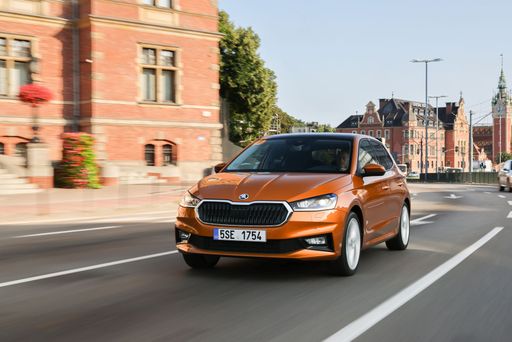 @ Škoda Auto a.s. / Škoda Storyboard
@ Škoda Auto a.s. / Škoda Storyboard
Skoda Fabia
Dacia Spring
The Dacia Spring is an unpretentious city electric that strips EV ownership down to the essentials, offering clean, fuss-free transport for daily urban life. It won't impress luxury-seekers, but its cheerful practicality and rock-bottom running costs make it a clever, no-nonsense choice for anyone who wants electric mobility without the drama.
details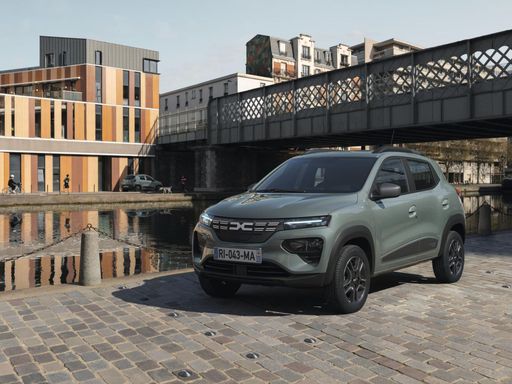 @ Dacia / Renault Group Media
@ Dacia / Renault Group Media
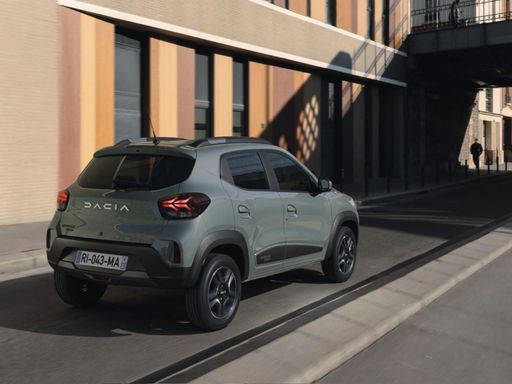 @ Dacia / Renault Group Media
@ Dacia / Renault Group Media
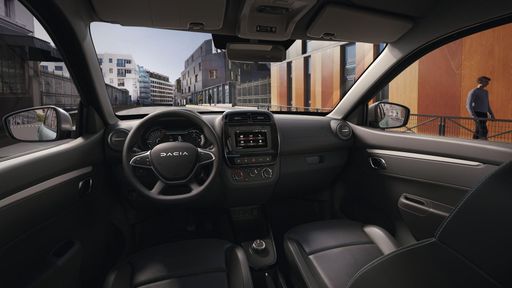 @ Dacia / Renault Group Media
@ Dacia / Renault Group Media
Skoda Fabia
The Skoda Fabia is a clever, no-nonsense small car that turns everyday chores into a breeze thanks to smart packaging and a surprisingly roomy cabin. It won’t set your pulses racing, but it’s a consistently sensible choice — reliable, easy to live with and blessed with a few neat tricks that make city life less faff.
details @ Škoda Auto a.s. / Škoda Storyboard
@ Škoda Auto a.s. / Škoda Storyboard
 @ Škoda Auto a.s. / Škoda Storyboard
@ Škoda Auto a.s. / Škoda Storyboard
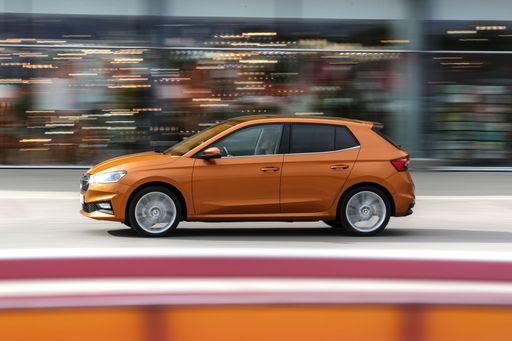 @ Škoda Auto a.s. / Škoda Storyboard
@ Škoda Auto a.s. / Škoda Storyboard
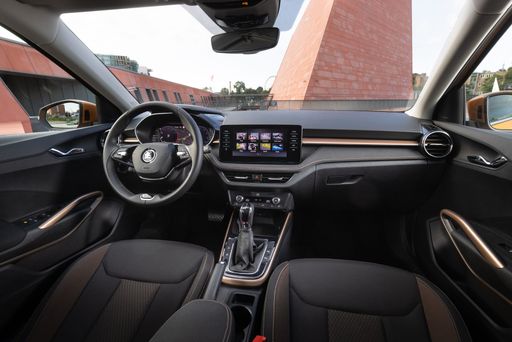 @ Škoda Auto a.s. / Škoda Storyboard
@ Škoda Auto a.s. / Škoda Storyboard
 @ Škoda Auto a.s. / Škoda Storyboard
@ Škoda Auto a.s. / Škoda Storyboard
 @ Dacia / Renault Group Media
@ Dacia / Renault Group Media
|
 @ Škoda Auto a.s. / Škoda Storyboard
@ Škoda Auto a.s. / Škoda Storyboard
|
|
|
|
Costs and Consumption |
|
|---|---|
|
Price
14500 - 17100 £
|
Price
16900 - 30500 £
|
|
Consumption L/100km
-
|
Consumption L/100km
4.9 - 5.6 L
|
|
Consumption kWh/100km
13.2 - 14.1 kWh
|
Consumption kWh/100km
-
|
|
Electric Range
225 - 228 km
|
Electric Range
-
|
|
Battery Capacity
26.80 kWh
|
Battery Capacity
-
|
|
co2
0 g/km
|
co2
112 - 126 g/km
|
|
Fuel tank capacity
-
|
Fuel tank capacity
40 L
|
Dimensions and Body |
|
|---|---|
|
Body Type
SUV
|
Body Type
Hatchback
|
|
Seats
4
|
Seats
5
|
|
Doors
5
|
Doors
5
|
|
Curb weight
1013 - 1050 kg
|
Curb weight
1143 - 1278 kg
|
|
Trunk capacity
308 L
|
Trunk capacity
380 L
|
|
Length
3701 mm
|
Length
4108 - 4137 mm
|
|
Width
1583 mm
|
Width
1780 mm
|
|
Height
1519 mm
|
Height
1458 - 1461 mm
|
|
Max trunk capacity
1004 L
|
Max trunk capacity
1190 L
|
|
Payload
265 - 302 kg
|
Payload
402 - 437 kg
|
Engine and Performance |
|
|---|---|
|
Engine Type
Electric
|
Engine Type
Petrol
|
|
Transmission
Automatic
|
Transmission
Manuel, Automatic
|
|
Transmission Detail
Reduction Gearbox
|
Transmission Detail
Manual Gearbox, Dual-Clutch Automatic
|
|
Drive Type
Front-Wheel Drive
|
Drive Type
Front-Wheel Drive
|
|
Power HP
44 - 65 HP
|
Power HP
80 - 177 HP
|
|
Acceleration 0-100km/h
13.7 - 19.1 s
|
Acceleration 0-100km/h
7.4 - 15.7 s
|
|
Max Speed
125 km/h
|
Max Speed
175 - 228 km/h
|
|
Torque
113 - 125 Nm
|
Torque
93 - 250 Nm
|
|
Number of Cylinders
-
|
Number of Cylinders
3 - 4
|
|
Power kW
33 - 48 kW
|
Power kW
59 - 130 kW
|
|
Engine capacity
-
|
Engine capacity
999 - 1498 cm3
|
General |
|
|---|---|
|
Model Year
2024
|
Model Year
2025
|
|
CO2 Efficiency Class
A
|
CO2 Efficiency Class
D, C
|
|
Brand
Dacia
|
Brand
Skoda
|
What drive types are available for the Dacia Spring?
The Dacia Spring is available as Front-Wheel Drive.
The prices and data displayed are estimates based on German list prices and may vary by country. This information is not legally binding.
